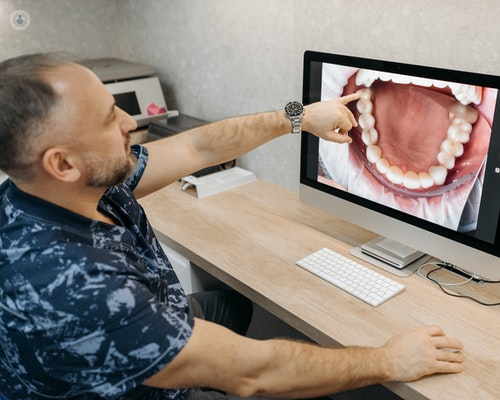How to relieve wisdom teeth pain: Part 2- Treatment
Written by:In part one of this article series, Mr Kunmi Fasanmade, a consultant oral and maxillofacial surgeon and wisdom teeth expert, gave us some insight into why we have wisdom teeth and why they can cause so much pain. In this second and final part, he shares some of the ways we can relieve this pain, including home remedies and extraction.

What can I do at home to relieve wisdom tooth pain?
I would recommend that you contact your dentist as soon as any pain develops in this area. However, in the interim good mouth rinses using chlorhexidine and saline (salt water solution) can be useful to minimise any risk of infection progressing. In addition, pain control using paracetamol and ibuprofen is a useful symptomatic relief prior to contacting the dentist. The next step however is to ensure that the dentist is contacted.
When should I see my dentist about wisdom tooth pain?
Any of the above situations is a trigger for individuals to contact their dentist. An impacted tooth and any resulting pain should be reported to the dentist as quickly as is possible.
When will they recommend wisdom tooth removal?
Removal of wisdom teeth is advisable under the following circumstances:
- When the wisdom tooth cannot be restored due to inaccessibility or extent of decay.
- The wisdom tooth that is causing difficulties with the surrounding area causing pain and difficulty with mouth opening. Any infection around the wisdom tooth as well as any abscesses in relation to the wisdom tooth will require removal. This would generally warrant a referral to a specialist like myself.
- Occasionally when a wisdom tooth is catching on the surrounding gum or cheek and causing pain and swelling this will also be a reason for a recommendation for the removal of the wisdom tooth.
- Also, decay in the adjacent tooth i.e. the second molar will warrant a referral to the hospital or a specialist practice for removal of the wisdom tooth such that the dentist can reliably and confidently restore the look of the second molar accordingly.
What can you expect from the procedure?
The procedure can be carried out whilst you are awake under a local anaesthetic, or under a general anaesthetic with you having a short hospital stay. Local anaesthetic procedures can be done with some element of sedation which can either be given into the mouth (oral sedation) or through an injection into a vein (intravenous sedation).
The procedure generally takes about half an hour and although the feeling of having something done in the mouth is quite stressful, the procedure itself is not one that would not generate any pain during the treatment, aside from when the local anaesthetic is been administered. This is managed very sensitively, and patients are looked after extremely well to keep anxiety levels down. There is the risk of injury to the nerve supplying feeling to the lip and chin, patients are always warned of this and adequate steps are taken to mitigate against this risk occurring.
The procedure will sometimes involve peeling back the gum and taking away some of the surrounding bone. The tooth may also have to be divided, so as to be able to remove it without having to sacrifice a significant amount of bone. This is then followed by suturing of the wound, where the gum is held together with 2 or 3 stitches. Patients are given post-operative instructions and discharged from the premises with a good advice regarding analgesia. I will then arrange for the patient to be reviewed back in my clinic about 2 weeks following the procedure.
If you're experiencing wisdom tooth pain, or any other condition related to the face and mouth, you can request an appointment with Mr Fasanmade by visiting his Top Doctors profile.


